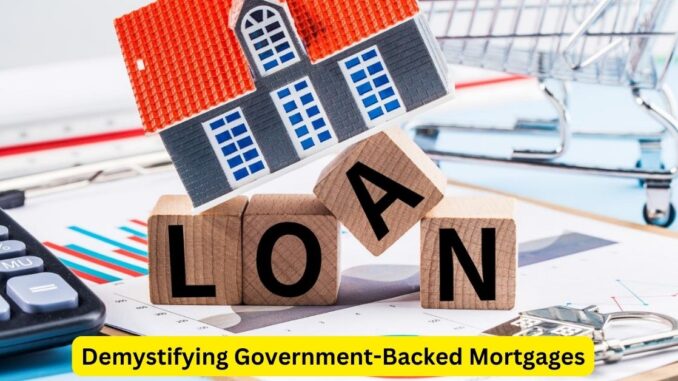
Government-backed mortgages provide alternative financing options that cater to specific borrower needs and circumstances. Understanding the nuances of these programs—FHA (Federal Housing Administration), VA (Department of Veterans Affairs), and USDA (United States Department of Agriculture)—is essential for prospective homebuyers seeking tailored loan solutions.
1. FHA Loans
- Purpose: FHA loans aim to assist first-time homebuyers and those with less-than-perfect credit by offering more accessible qualification criteria and lower down payment requirements.
- Features: Borrowers can qualify with a credit score as low as 500 (with a 10% down payment) or 580 (with a 3.5% down payment). FHA loans often require a down payment as low as 3.5% of the home’s purchase price.
- Mortgage Insurance: FHA loans necessitate mortgage insurance premiums (MIP) regardless of the down payment amount, which adds to the overall cost of the loan.
2. VA Loans
- Purpose: Exclusive to eligible military service members, veterans, and their families, VA loans are designed to offer accessible financing with no down payment for those who have served in the military.
- Features: VA loans usually do not require a down payment, making homeownership more attainable for qualified veterans. Additionally, they often have more lenient credit score requirements.
- Funding Fee: VA loans may entail a funding fee, but this fee can be rolled into the loan amount and not paid upfront by the borrower in some cases.
3. USDA Loans
- Purpose: USDA loans aim to promote homeownership in rural and suburban areas by offering affordable financing options to low-to-moderate-income households.
- Features: USDA loans provide 100% financing, meaning no down payment is required for eligible borrowers. These loans also offer competitive interest rates and flexible credit requirements.
- Location Eligibility: Properties must be located in USDA-designated rural areas to qualify for this program.
Key Considerations
- Eligibility Requirements: Each government-backed mortgage program has specific eligibility criteria related to income, credit score, property type, and location.
- Insurance and Fees: While these programs offer benefits such as low down payments or no down payments, they may include mortgage insurance or funding fees, impacting the overall cost of the loan.
- Loan Limits: Each program has its own loan limits, setting the maximum amount a borrower can obtain.
Understanding the differences and advantages of FHA, VA, and USDA loans empowers homebuyers to select the best-suited mortgage option based on their financial situation, military service status, location, and homeownership goals. Consulting with mortgage professionals or lenders specializing in these programs can provide further insights into eligibility and guide borrowers in making informed decisions when pursuing government-backed mortgages.
Leave a Reply